BEING BILLY
Against all odds, Billy Porter is a magnificent couture creation of his own making — one that has conquered the worlds of music, acting and fashion.
WORDS BY BERNADETTE MORRA
Billy Porter is a hugger. But I don’t realize this at first. He arrives at the FASHION cover shoot in a studio near New York’s Hudson Yards serving feisty realness like only Porter can. He is animated and emphatic as he bellows into his cellphone dealing with some issues around his divorce. In fact, he is so fired up that I can hear him coming from way down the hall. But when he finishes the call, he takes a deep breath and centres himself. And after that, there are cheery greetings and hugs all around — for me, for senior creative director George Antonopoulos, for the photographer, for the videographer and even for the fashion assistants. I get the feeling that if a cleaner were to come in to empty the trash bins, they would receive a hug, too.
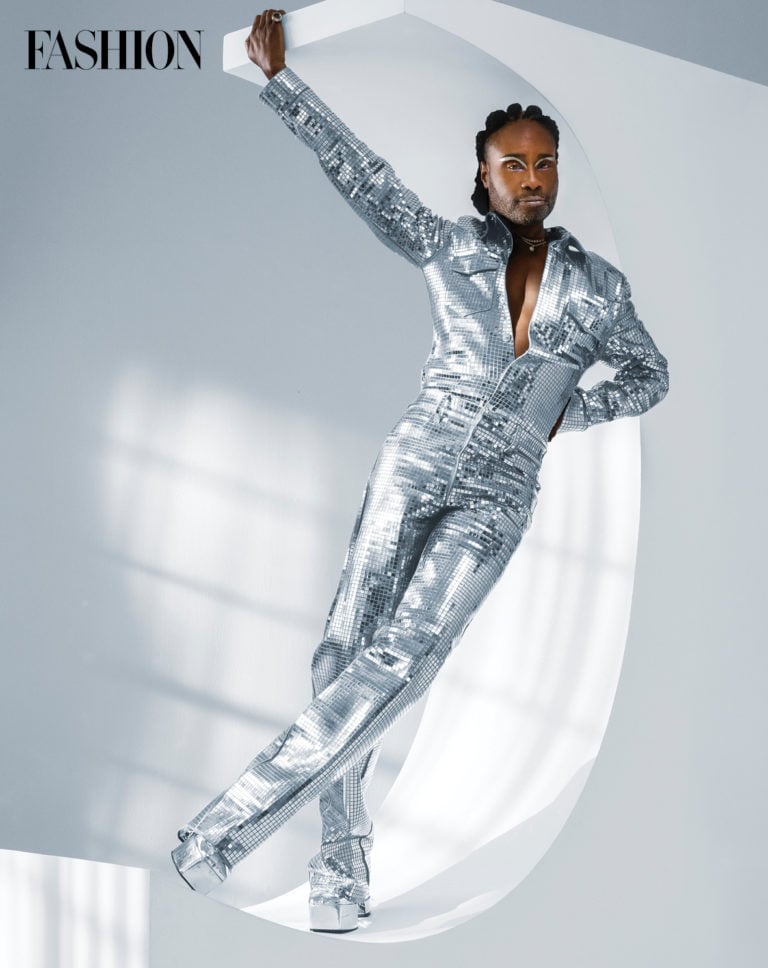
Top, $20,595, pants, $19,950, and necklace (bottom), $970, Gucci. Boots, $295, Syro. Necklace (top), $550, and ring, $375, Dean Davidson.
Porter marches over to the makeup chair, where his beloved glam team is waiting. Makeup artist La Sonya Gunter has been working with Porter since 2013, when he was headlining the Broadway hit Kinky Boots, for which he won a Tony Award for Best Actor in a Musical. “You may see us bicker because she’s like my sister,” he tells me, waving his hand at Gunter. “From the first day,” she drawls. Later, his real half-sister MaryMartha Ford (nicknamed “M&M”), who works as one of his managers, drops by. It’s clear that Porter surrounds himself with a fun but selective mix of biological and chosen family. At one point, hairstylist Cheryl Bergamy-Rosa and Porter give me a lesson on “doodoo” or “dookie” braids — so called because they are the thickness of poop. “That’s an old-school southern term — we are lettin’ you in, woman!” Porter howls with a throaty laugh.
Letting people in seems to come naturally to the extroverted Porter, though in his 2021 memoir, Unprotected, he admits to erecting emotional walls to keep people out. And with good reason. His childhood was challenging, to say the least. At age five, he was sent to a doctor in an attempt to “fix” his love of girlie clothes and skipping rope. He was bullied and beaten (even on his first day of school), twice landing him in hospital. His stepfather sexually abused him from ages seven to 12, a violation that is even more heinous considering how he manipulated Porter into viewing him as a father figure and a source of comfort. Singing became an outlet, then a job, then a career. Things got off to a great start when he won Star Search, and US$100,000, in 1992 at age 22. But this is a world in which talent isn’t always enough. Porter has been told he sings too high and speaks too white. He’s been pigeonholed into playing Black stereotypes and passed over for being “too flamboyant.” But along the way, he learned to stand up for himself and was always certain of his talent. If you haven’t seen Porter’s confidence on display, Google his impromptu rendition of “Everything’s Coming Up Roses” at the 2019 Tony Awards.
Kinky Boots arrived at a point when he was bankrupt and homeless and sleeping on a patron’s couch. Even so, he took a chance and spoke up to convince the producers that his character should be gay and not a straight cross-dressing boxer, as originally written. They agreed. It was the first time he would see himself — a gay Black man playing a gay Black man — on Broadway.
I don’t move through the world ultra-masculine. I don’t move through the world ultra-feminine. I’m just there.
The show was a hit, but not without backlash. After a performance during the 2013 Macy’s Thanksgiving Day Parade, the Kinky Boots message of love and tolerance was attacked by right wingers. “I find it really odd that what I’m doing over here in my own life triggers you so much over there that you feel the need to beat me, hate me, shame me, take my rights away,” he says sharply. “Just leave me alone. Just leave us alone. Who am I hurting by expressing myself in this fabulous way? Nobody.”
More than 10 years later, Porter, at age 54, is pushing back harder than ever against hate— especially the type that comes from within. He is an outspoken role model for self-acceptance, something that is reflected in every aspect of his work. “When you are connected spiritually to all the things you embody, that’s where the healing lies,” he believes. Healing is something he talks about a lot. Of the 12 songs on Porter’s album Black Mona Lisa, released last November, almost all touch on his (sometimes rocky) road to overcoming shame, including his 2021 decision to come out as HIV positive after 14 years. His role as the ballroom emcee Pray Tell on Pose, a series set during the AIDS crisis in ’80s/’90s New York, helped with the emotional fallout from that trauma. “I lost more people by the age of 21 than my grandmother had at age 85,” Porter laments. “I used to always wonder ‘Why did I stay alive?’ Then I got that job and I’m like, ‘Oh, I survived to tell the story.’” He made history in 2019, when he became the first openly gay Black man to win an Emmy for Outstanding Lead Actor in a Drama Series. His rousing speech proclaimed “The category is love, y’all!!!” and he quoted author and civil rights activist James Baldwin: “‘It took many years of vomiting up all the filth I’d been taught about myself, and half-believed, before I was able to walk on the earth like I had a right to be here.’ I have the right. You have the right. We all have the right.”
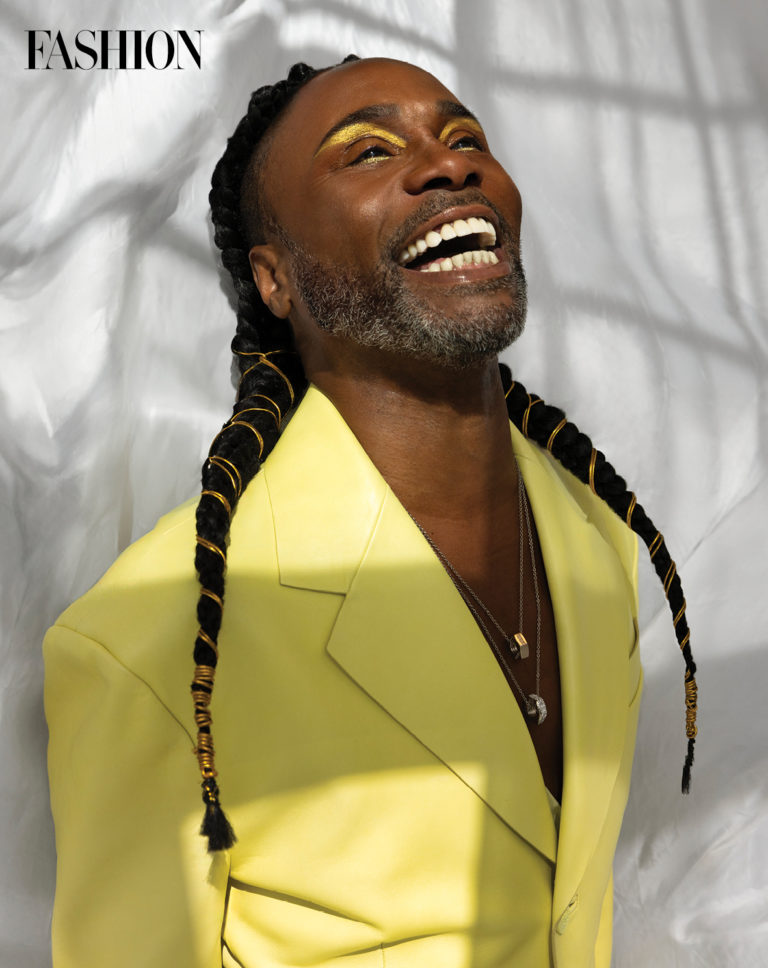
Jacket, top and necklace (bottom), prices upon request, necklace (top), $550, Versace.
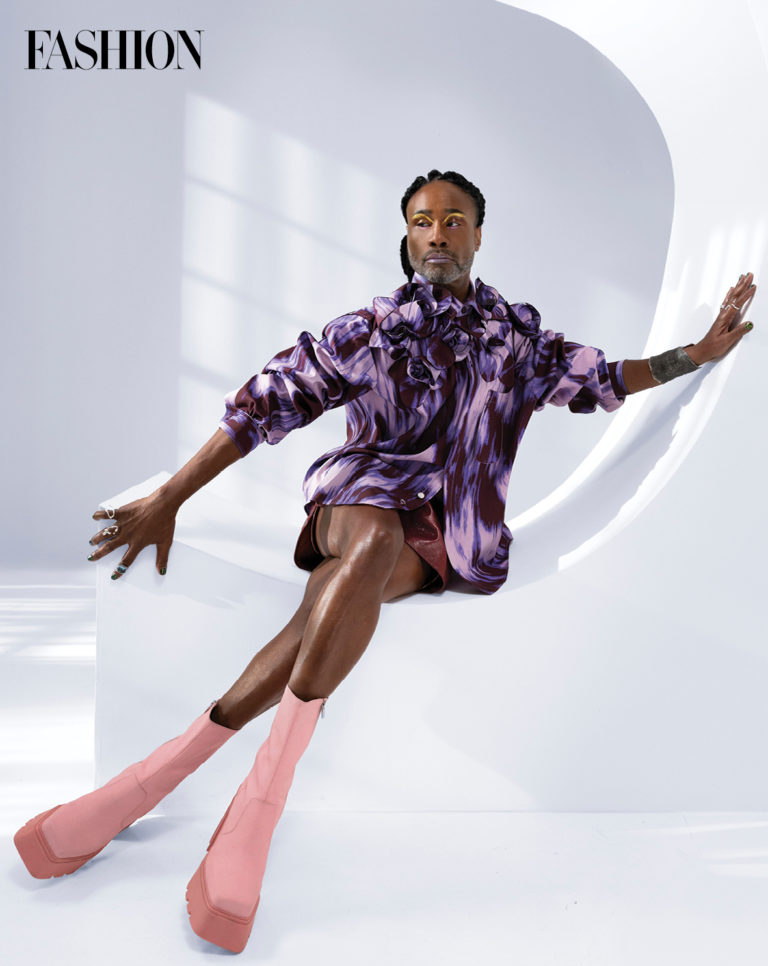
Top and shorts, prices upon request, Aknvas. Boots, $295, Syro. Bracelet, $1,490, Sterling King. Signet ring, $375, Dean Davidson. Rings, $15 each, H&M.
Unfortunately, not everyone agrees. A gay man in a dress is somehow perceived as a threat, especially to children, while a straight man in a dress — be it Robin Williams as Mrs. Doubtfire or Dustin Hoffman as Dorothy Michaels in Tootsie — is considered entertaining. Whether a predator is wearing a dress or not while engaged in sexual misconduct has absolutely nothing to do with it, Porter writes in his memoir. And no one knows that better than him. Furthermore, he questions why dresses are seen as masculine in certain contexts but not in others. “I was watching a fashion show by this African designer, and every single one of those men was in traditional African dress, which is a dress,” he points out. “So it’s weird to me that I get attacked for just expressing myself that way. Preachers wear robes. Jesus wore a robe. That’s a dress, y’all. So back up and leave me alone.”
Porter bursts into a few bars of song, something he does throughout the day. Maybe it’s a way of releasing tension. Like many artists, Porter seems thoroughly guided by a combination of intuition and angst. He moves with abandon in front of the camera, alternating sudden spins with balletic stances and graceful arm gestures. But he is specific about how he wants his hair and beard to look. “I have a very feminine face and a high, raspy voice, so it doesn’t take much for me to be misgendered,” he says. “If the hair looks feminine, then people start calling me ‘ma’am.’ That’s not a problem. But I want rock ’n’ roll edgy, not feminine, and there’s a fine line. It’s non-binary, really. I think if I were younger, I would probably identify as non-binary. Because I don’t move through the world ultra-masculine. I don’t move through the world ultra-feminine. I’m just there.”
Porter’s efforts to de-gender clothing are nothing short of magnificent, most notably with the Christian Siriano tuxedo gown he wore to the 2019 Oscars. The look broke the internet, and every one of his Met Gala and red-carpet appearances since have nudged forward the concept of what a man could, and perhaps even should, wear. “Fashion exists in a really expansive space for me,” he says. “It’s spiritual and political. Every time I show up, I’m a walking piece of activist art.”
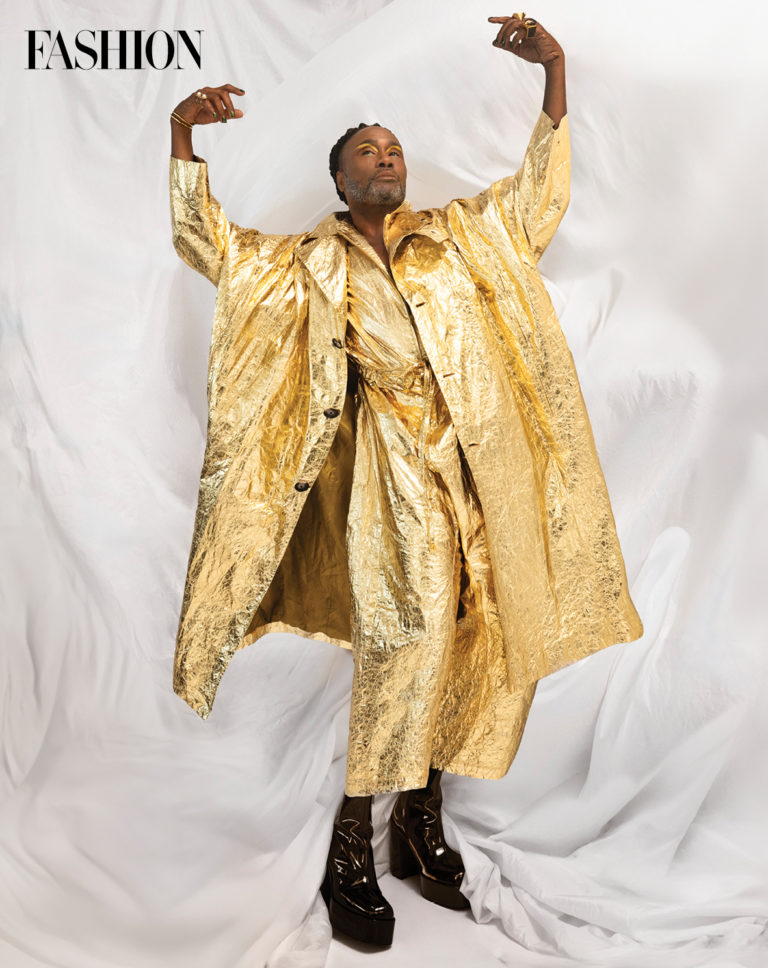
Coat and jumpsuit, prices upon request, A. Potts. Boots, $2,575, Christian Louboutin. Bracelet, $11,400, Tiffany & Co. Ring (left), $5,835,
State Property. Ring (middle), $255, and ring (right) with base, $490, Acchitto.
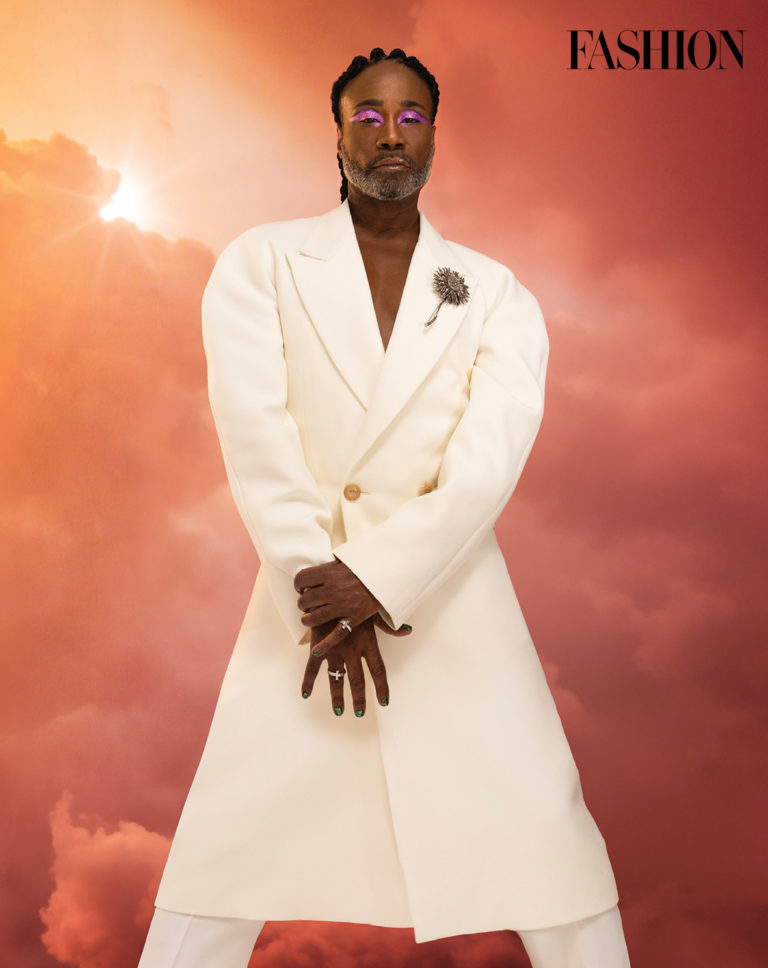
Coat, $5,880, pants, $1,175, and brooch, $1,070, Alexander McQueen. Ring (bottom), $7,150, and ring (top), $3,700, Tiffany & Co.
Avant-garde designers Yohji Yamamoto, Rick Owens and Rei Kawakubo of Comme des Garçons are among his go-to names. “And I love wearing Thom Browne when people need to know I’m educated and fancy at the same time,” Porter says. “He takes classic silhouettes and suits and explodes them into the fantastical. That’s me. I’m very classic, but I’m also way over the top. I think people would be surprised at my closet, because I have really simple stuff for my everyday life.” Or at least his definition of simple, like the oversized black Yohji jumpsuit with swinging silver chains that he shows up to set in. His caftans run from solid-coloured sequins to psychedelic swirls. The loose cover-ups were his uniform during the COVID shutdowns, an experience that was painfully triggering. “COVID was like being snatched right back into the AIDS crisis,” he shares.
Being fully Billy will hopefully include having his own fashion brand one day. “I’ve learned over the past few years how specific my vision is and how freeing it is to people,” he says. In the meantime, Porter continues to slay with his music and onscreen. After playing a divorcing dad locked in a custody battle in Our Son, released last December, he will turn his attention to the role of Baldwin in an upcoming biopic. And he’s spreading love, and lots of hugs no doubt, by setting up a philanthropic foundation and by playing an advisory role on The Bow, a digital hub for LGBTQIA2S+ people in the works by Toronto creative director Matthew McLaughlin. “I ain’t stopping,” Porter vows. “Like I say on the album, ‘Haven’t even started yet. Haven’t even broke a sweat,’ darlings. There’s so much work to do.”
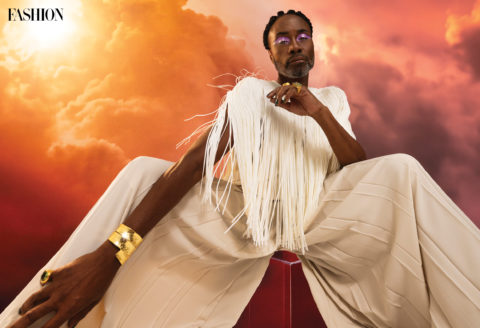
Top, $1,455, Hervé Léger. Pants, price upon request, Hyke. Bracelet, $30, Zara. Rings, from $350, Dean Davidson.
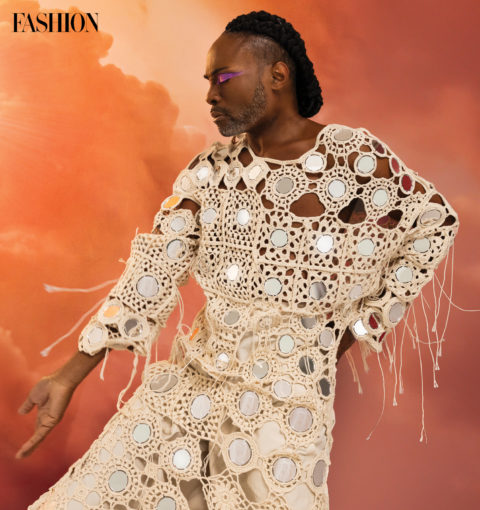
Dress and pants, prices upon request, Stella McCartney.
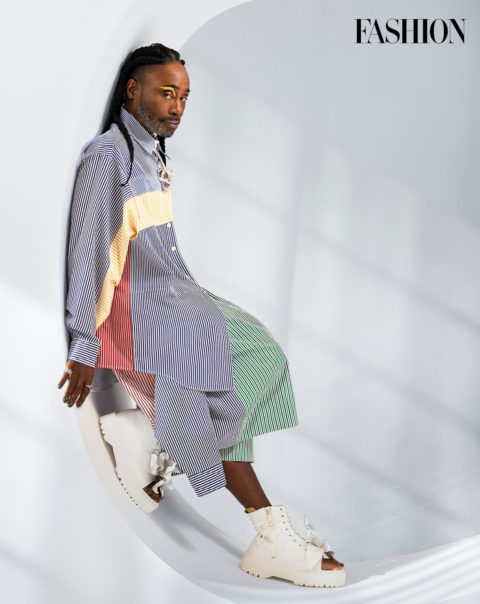
Top, $875, and shorts, $975, Zankov at Nordstrom. Shoes, price upon request, Aknvas. Necklace, $780, Sterling King. Ring (left), $625, and ring (right), $425, Versace.
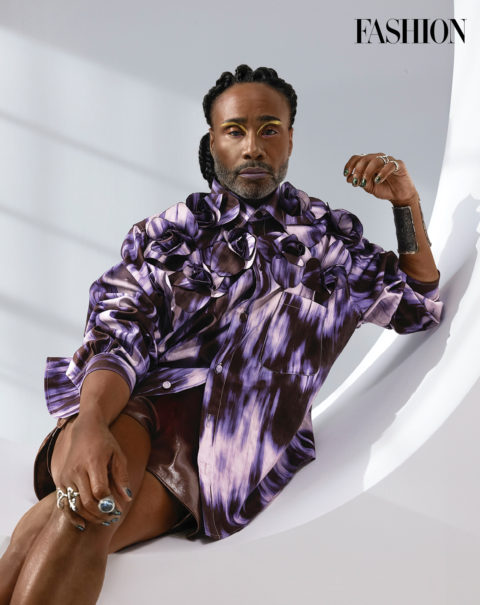
Top and shorts, prices upon request, Aknvas. Boots, $295, Syro. Bracelet, $1,490, Sterling King. Signet ring, $375, Dean Davidson. Rings, $15 each, H&M.
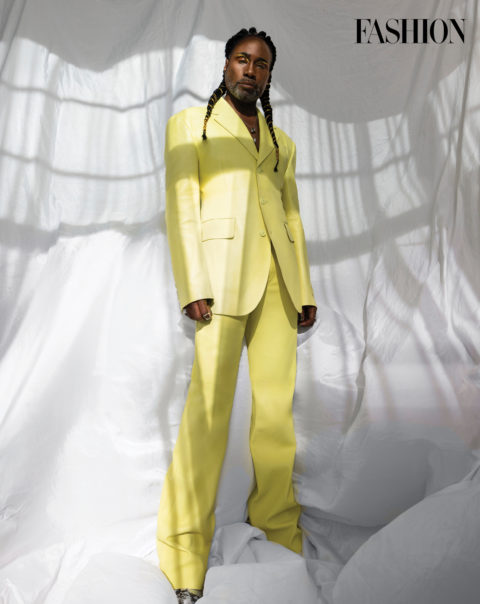
Jacket, top, pants and necklace (bottom), prices upon request, necklace (top), $550, ring (left), $625, and ring (right), $425, Versace. Ring (middle), $4,265, White Space. Boots, $2,375, Christian Louboutin.
1/5
2/5
3/5
4/5
5/5
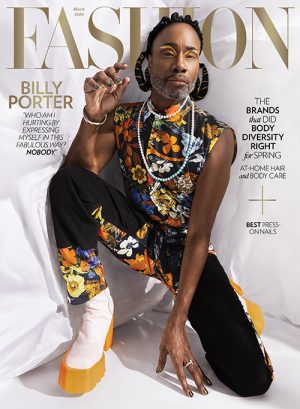
PHOTOGRAPHY BY NICK MERZETTI
VIDEO AND LIGHTING BY SHAYNE GRAY
STYLING AND CREATIVE DIRECTION BY GEORGE ANTONOPOULOS
BEAUTY DIRECTION BY SOUZAN MICHAEL GALWAY
HAIR Cheryl Bergamy-Rosa for Exclusive Artists/Contents Hair Care, Eco Style and Dyson. MAKEUP La Sonya Gunter.
FASHION ASSISTANTS Alexis Ayala and Tess Jameson. FASHION INTERNS Hodaly Garcia and Keila Garcia.
The post Billy Porter Is <em>FASHION</em>’s March 2024 Cover Star appeared first on FASHION Magazine.
